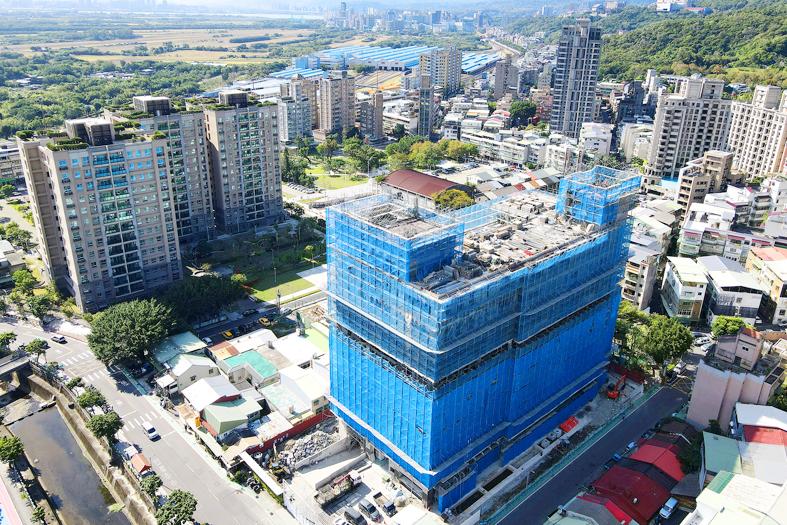Most Taiwanese find housing price hikes acceptable, as long as the mortgage burden falls within 35 percent of their household income, a survey by Sinyi Realty Inc (信義房屋) said yesterday.
About two-thirds of respondents cap mortgage payments at within 35 percent of household income, but would grant more flexibility for houses in Taipei, the survey showed.
About 13 percent said they could go as high as more than 50 percent for houses in the capital, Sinyi research manager Tseng Ching-der (曾進德) said.

Photo: CNA
The rising trend in property prices has not dampened purchasing interest, because most home buyers still manage to get loans within the 35 percent limit, he said.
The 35 percent limit is sustainable, because banks are increasingly offering 30-year mortgage payment schemes, from mostly 20 years in the past, making home purchases more accessible, Tseng added.
As high as 73 percent of respondents in Taichung said they could tolerate a 35 percent mortgage burden, followed by 70 percent in Tainan, 69 percent in New Taipei City and Taoyuan, 68 percent in Hsinchu City, and 62 percent in Taipei.
In Taipei, 38 percent of respondents said they could accept a mortgage burden of more than 40 percent, compared with 27 to 37 percent for home buyers elsewhere, it said.
The findings are not surprising given that housing prices are much higher in Taipei, Tseng said, adding that record-low interest rates and a longer grace period of up to five years for first-home buyers have lent support to home purchases.
However, Tseng warned against overleveraging, as central bank Governor Yang Chin-long (楊金龍) last week indicated that he would move toward normalizing the monetary policy next year, with potential rate hikes of 25 basis points if all sectors emerge from the COVID-19 pandemic and inflationary pressures increase.
Home buyers should give serious thought to taking on a higher mortgage burden and see if their life would remain the same, given potential rate hikes next year, Tseng added.

Six Taiwanese companies, including contract chipmaker Taiwan Semiconductor Manufacturing Co. (TSMC), made the 2025 Fortune Global 500 list of the world’s largest firms by revenue. In a report published by New York-based Fortune magazine on Tuesday, Hon Hai Precision Industry Co. (better known as Foxconn) ranked highest among Taiwanese firms, placing 28th with revenue of US$213.69 billion. Up 60 spots from last year, TSMC rose 60 places to reach No. 126 with US$90.16 billion in revenue, followed by Quanta Computer Inc. at 348th, Pegatron Corp. at 461st, CPC Corp., Taiwan at 494th and Wistron Corp. at 496th. According to Fortune, the world’s

NEW PRODUCTS: MediaTek plans to roll out new products this quarter, including a flagship mobile phone chip and a GB10 chip that it is codeveloping with Nvidia Corp MediaTek Inc (聯發科) yesterday projected that revenue this quarter would dip by 7 to 13 percent to between NT$130.1 billion and NT$140 billion (US$4.38 billion and US$4.71 billion), compared with NT$150.37 billion last quarter, which it attributed to subdued front-loading demand and unfavorable foreign exchange rates. The Hsinchu-based chip designer said that the forecast factored in the negative effects of an estimated 6 percent appreciation of the New Taiwan dollar against the greenback. “As some demand has been pulled into the first half of the year and resulted in a different quarterly pattern, we expect the third quarter revenue to decline sequentially,”

WEAKER ACTIVITY: The sharpest deterioration was seen in the electronics and optical components sector, with the production index falling 13.2 points to 44.5 Taiwan’s manufacturing sector last month contracted for a second consecutive month, with the purchasing managers’ index (PMI) slipping to 48, reflecting ongoing caution over trade uncertainties, the Chung-Hua Institution for Economic Research (CIER, 中華經濟研究院) said yesterday. The decline reflects growing caution among companies amid uncertainty surrounding US tariffs, semiconductor duties and automotive import levies, and it is also likely linked to fading front-loading activity, CIER president Lien Hsien-ming (連賢明) said. “Some clients have started shifting orders to Southeast Asian countries where tariff regimes are already clear,” Lien told a news conference. Firms across the supply chain are also lowering stock levels to mitigate

DIVERSIFYING: Taiwanese investors are reassessing their preference for US dollar assets and moving toward Europe amid a global shift away from the greenback Taiwanese investors are reassessing their long-held preference for US-dollar assets, shifting their bets to Europe in the latest move by global investors away from the greenback. Taiwanese funds holding European assets have seen an influx of investments recently, pushing their combined value to NT$13.7 billion (US$461 million) as of the end of last month, the highest since 2019, according to data compiled by Bloomberg. Over the first half of this year, Taiwanese investors have also poured NT$14.1 billion into Europe-focused funds based overseas, bringing total assets up to NT$134.8 billion, according to data from the Securities Investment Trust and Consulting Association (SITCA),